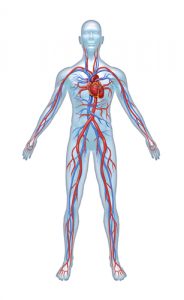Your Vascular Health
Our scans are an important part of your vascular disease management or to test your vascular health, but they are not the ‘be all and end all’ of your treatment plan.
By introducing certain habits into your day-to-day routine, you can greatly reduce the severity or the onset of vascular disease. Prevention is much better than cure.
Read on to learn how your vascular system works, and what you can do to maintain optimal vascular health.
The Vascular System

The vascular system is comprised of your heart, blood vessels and blood in your body. The largest vein (Inferior Vena Cava aka. IVC) and artery (Aorta) stem from the heart. Low in the abdomen, the IVC and Aorta split into two major leg arteries, the Iliac arteries and Iliac veins. As blood vessels head towards the extremities of the hands and feet, the blood vessels become smaller and smaller, ending as vessels called capillaries. These capillaries can be small enough to allow just a blood cell or two to travel down at a time. Capillaries, arteries and veins infiltrate every area of body tissue to transport nutrients, oxygen and metabolic waste throughout the body.
Where problems can occur
These vessels are springy, durable and with even wall thickness when we’re young, but as we age, they can be subject to:
- toughening
- scarring (sclerosis), or
- pressure imbalance due to blockages, such as cholesterol build up (scale) on the inside of vessels.
Aneurysms can also occur. These are failures of the blood vessel wall, that make the vessel bulge out from the pressure of the blood flow. When aneurysms rupture, internal bleeding can occur, which can be deadly.
Some vascular issues cause pain and whilst not comfortable, pain can be useful in making you aware that there is a possible problem. If you are feeling any type of pain, from a low level dull pain, to a sharp pain, it is very important to have the source of the pain diagnosed as soon as possible. Some vascular issues need to be treated immediately.
What causes damage to the vascular system?
Certain lifestyle habits are harmful to the vascular system, such as:
- Smoking
- Drinking alcohol
- High cholesterol diet
- Not getting enough physical exercise
- Stress
- Being overweight or obese
It is imperative to stop these bad habits and work on preventing vascular issues, even if you don;t have an issue at present.
Damage can also be caused by genetic/hereditary factors, or because of other health issues, such as a bodily trauma or injury. If your family has a history of vascular disease it is important to keep this in mind throughout your life, and to be proactive from an early age in monitoring your health with vascular specialists.
What can I do to help prevent vascular disease?
It’s not surprising to learn that by doing the opposite to the bad habits listed earlier, you can go a long way to protecting and preserving your vascular health.
It’s easy to dramatically reduce your likelihood of developing vascular disease by cultivating good lifestyle habits such as:
- Exercise
- Quit smoking
- Eat a healthy diet with plenty of vegetables, lean protein, good fats and wholegrains
- Stay hydrated
- Reduce stress in your life, through strong support networks, friendships, and improving your work-life balance
- Perform regular checkups
- Nurture a good relationship with your GP and vascular doctor/surgeon
Living with vascular disease
It can be worrying to discover through a general checkup, or a sudden health scare, that you have a vascular disease, illness or injury. You may be wondering how long you will be ill for, what will happen, and how you can return to optimal health.
It is at this point that it’s critical to view your vascular health as a long term ‘project’, and you need a team around you to review your health, help you improve your lifestyle and plan for your future.
Your dedication to a treatment plan is essential to preventing further, more serious complications.
Your vascular health team
Your vascular health is managed by an ongoing series of various diagnostic and treatment methods, such as:
- Diagnostic scans
- Reviews
- GP visits
- Vascular surgeon visits
- Medication
- and at times, surgery or surgeries
The team that manages this planning and performs the reviews is usually a combination of your:
- GP: who writes referrals to perform scans and visit the vascular surgeon
- Vascular surgeon: who reviews your health, diagnoses vascular disease, advises on surgery or other treatment methods and writes referrals for all vascular diagnostic tests.
- Vascular sonographers: who perform the diagnostic tests needed by your Vascular surgeon to create your treatment plan.
As vascular sonographers, our team at North Shore Vascular Laboratory looks forward to welcoming you for your upcoming scan, and hope to work with you on maintaining your optimal vascular health.
How to get the best out of your treatment plan
Cultivating a strong relationship with your health team, and following their advice consistently, is a great way to work through your treatment plan with the best possible results.
Be sure to:
- Keep open communication with your team
- Advise your GP and surgeon of any changes to your symptoms or if you have concerns
- Discuss your questions with your team if you are worried about your condition
- Follow their advice to the letter
- Be honest – advise them if you have not succeeded in breaking bad habits, such as smoking or drinking alcohol.
- Do not hesitate to seek help if you are experiencing an adverse reaction to a medication or a surgery.



